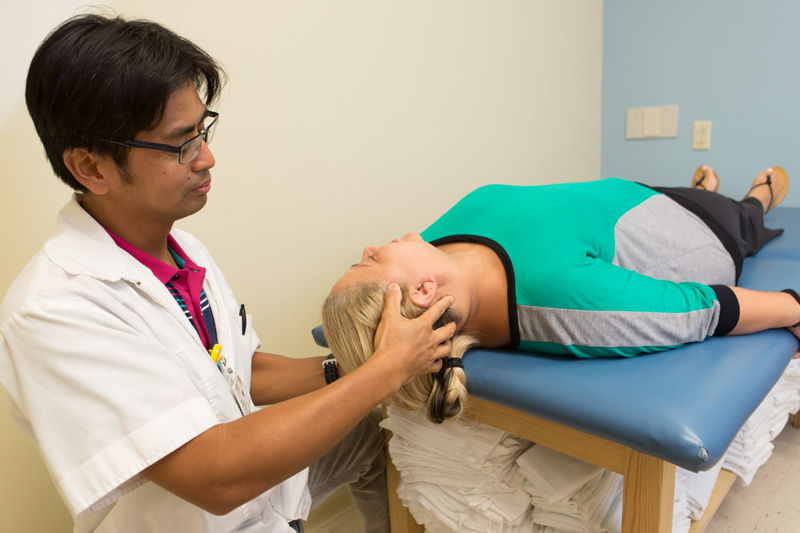Vertigo, a dizziness disorder most often caused by problems in the inner ear, may not seem to have any obvious link to osteoporosis, a disease that lowers bone density and increases the risk of fracture. But studies conducted in the last several years suggest such a link may exist.
The most common form of vertigo is called BPPV—benign positional paroxysmal vertigo. It occurs when tiny calcium particles clump up in the canals of the inner ear and affect the person’s balance. Ryan Evaristo, a Registered Physical Therapist at the Indian River Medical Center, treats many patients with BPPV. He says, “It’s a random kind of illness. The calcium particles can become dislodged for an obvious reason, like if the person hits their head. But in many cases, there’s no clear reason.”
Laura Hillenbrand, the author of “Seabiscuit” and “Unbroken,” describes vertigo as a feeling that “The floor is pitching up and down. Things seem to be spinning. It’s like standing on the deck of a ship in really high seas.” Unsettling and disorienting, for sure.
Vero’s Evaristo says that anyone who has recently experienced a feeling of spinning should see their primary care physician, as symptoms can come and go based on the positioning of the calcium particles in the ear. If the diagnosis is BPPV, Evaristo strongly recommends physical therapy; he has seen patients who were suffering for many months have their BPPV resolve after only a couple of physical therapy sessions. In those sessions, head movements are used to coax the calcium particles out of the inner ear canal and back to the inner ear chamber for absorption into the body.
One of the studies on the possible link between BPPV and osteoporosis was conducted at the Seoul National University College of Medicine in Korea. The research team looked for osteoporosis in two groups of people:
• A group of 209 with BPPV
• A “control” group of 202 with no history of vertigo.
After making certain adjustments typical in such studies (age, sex, alcohol consumption, smoker or non-smoker), the results showed that people with osteoporosis were three times more likely to have vertigo than people with normal bone density.
In 2014, a group of researchers affiliated with several hospitals in China analyzed seven past studies and came to the conclusion that BPPV may, indeed, be associated with osteoporosis.
The researchers went on to say that the medications used to treat osteoporosis may be able to prevent the occurrence and recurrence of BPPV. That’s a cautious statement, but one of interest to chronic BPPV sufferers.
One of the main forms of osteoporosis treatment are medications called bisphosphonates, which work by increasing bone density. Two of these drugs – brand names Fosamax and Actonel – have also been shown to lower the risk of spine and hip fractures.
Structured exercise programs and changes in diet also have been shown to reduce the incidence and severity of osteoporosis.
Evaristo says BPPV is also tied to posture. “Many people spend too much time on their smart phones or tablets,” he says. “Their heads stay in one position—pointed down—for too long. This can cause problems with both the inner ear and the neck.” It’s likely that people who wired into their devices will remain so, but Evaristo advices people to take frequent breaks and move their head to other positions.
There does not appear to be a link between osteoporosis and other, less common, causes of vertigo:
• Meniere’s disease, an inner ear disorder caused by a buildup of fluid and changing pressure in the ear,
• Vestibular neuritis, an inner ear problem, usually related to a viral infection, which causes inflammation around nerves that are important for balance.
In addition to the dizziness of feelings of spinning or swaying, vertigo can cause nausea, headache, sweating, and ringing in the ears. Attacks are often triggered by a change in head position, and can last for several minutes or several hours, although the spinning associated with BPPV is of short duration. Ryan Evaristo says, “If the symptoms last longer than a few seconds or minutes, it’s not BPPV. It could be caused by an infection, or something more systemic.”
If the vertigo is caused by an inflammation, steroids might be used to reduce swelling; antibiotics can be used if the vertigo is caused by an infection. It is rare that surgery is indicated for vertigo.
The Indian River Medical Center is located at 1000 36th St in Vero Beach; the main phone number is 772-567-4311.

